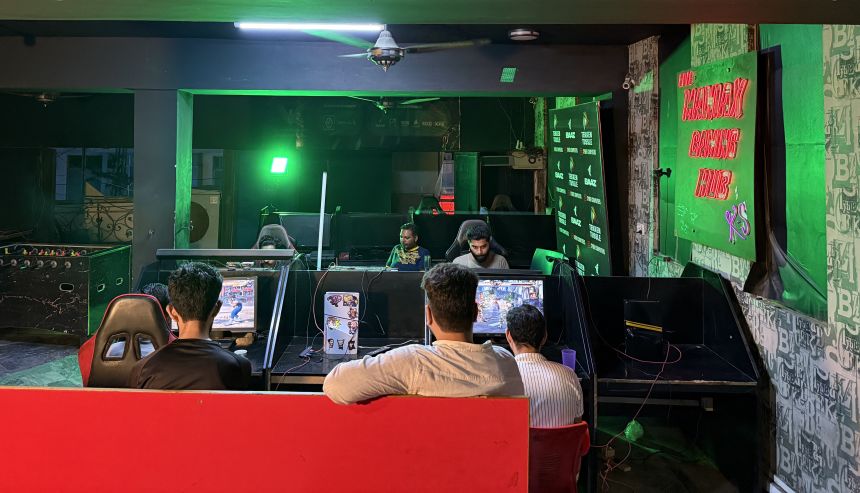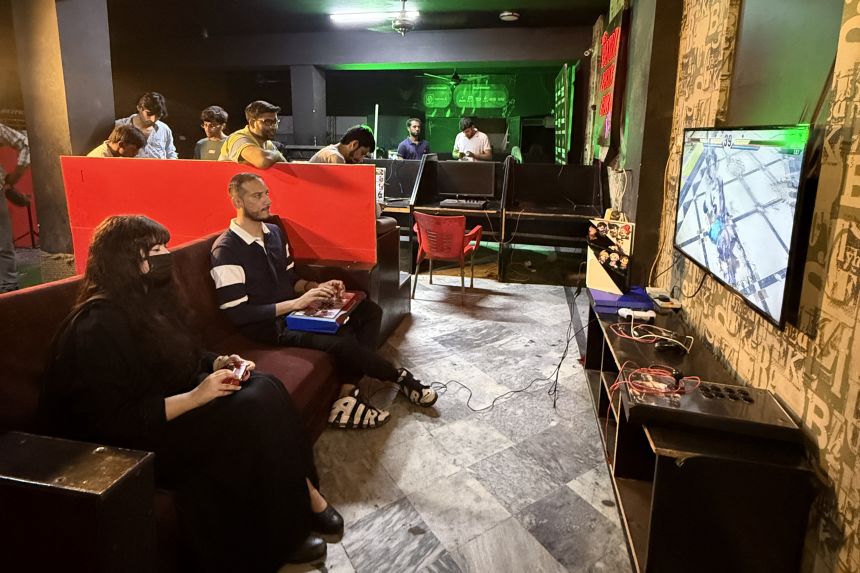Lahore, Pakistan
—
On a wet monsoon evening in Pakistan’s bustling city of Lahore, the generators sputter and the lights flicker in Maniax, a grimy but legendary gaming arcade powering the country’s unlikely dominance of a lucrative corner of the Esports world.
Three out of the world’s top 10 players of the classic Japanese fighting game Tekken are from Pakistan. They’re cracking (virtual) skulls on the international circuit, filling the rosters of lucrative Saudi-backed teams and taking home tens of thousands of dollars in prize money.
That’s a punchy statistic for a country better known for its recurring political turmoil and where a PlayStation or a PC costs more than the monthly average income. The electricity needed to power it isn’t always guaranteed, either.
The first Tekken came out in 1994 and the franchise is now in its eighth installment, with millions of copies sold every time a new version is launched. Players choose from a stable of fighters including kung-fu experts, a space ninja and a giant panda, to punch, kick, chop and throw their way to a knockout.
It’s not the most popular game in the billion-dollar Esports market, but it’s lucrative. In August, South Korean gamer “Ulsan” took $250,000 in prize money after winning the Esports World Cup in Tekken 8.
Tekken’s champion in Pakistan is Arsalan “Ash” Siddique, a quietly assured 30-year-old from Lahore. He wore a squad shirt with his gaming name emblazoned on the back when he met CNN, at the co-working space in a leafy suburb of Lahore where he trains. The room was narrow but studded with his trophies, and on a shelf a golden console glittered among anime figurines. In a bustling market nearby, he featured on a billboard advertisement for a telecoms company.
Ash, who practices eight hours every day, is a former ESPN Esports Player of the Year, and the first Red Bull athlete from Pakistan. He’s won five back-to-back Evolution Championship Series, tournaments held globally that focus exclusively on fighting games. On a ritzy August weekend in Las Vegas, he clinched his sixth EVO win, taking home $12,000 in prize money.
That final in Las Vegas was an all-Pakistan affair, with Ash defeating his friend Atif Butt, with whom he’d spent weeks in the Lahore studio, practicing combos of punches, kicks and chops.
But like many other gamers in Pakistan, their skills were forged in public arcades like Maniax. Playing Tekken in private means forking out close to $700 for a PlayStation – out of reach for most in Pakistan, where the average monthly salary is $300.
Later that night in Maniax, disheveled gaming chairs were scattered about, and rainwater seeped in from the giant window. “Dil Se,” a popular Bollywood tune, played across the speakers as intent gamers pounded their consoles in the flashes of a thunderstorm. In a corner, a young man repaired and customized arcade joysticks, a precious commodity not available in the country and which retail at about $300.

Bawaqar Haider, 35, who goes by the game name Soul Dagger, is one of the co-founders of Maniax, and has been a fan of Tekken since he was a kid. In his arcade, he says, “you basically have no discrimination … the whole arcade is mostly skill-driven.”
Arcade culture has been the driver of Tekken’s popularity in Pakistan, says Butt – who now represents the Saudi Esports organization Team Falcons.
The game was relatively easily available and cheap for arcades to install in the 1990s and early 2000s, making it “more easily available” to young gamers, he said.
Haider believes Pakistan’s hardscrabble environment has created a “ruthlessness” among its young gamers. Most of the country’s under-30 demographic – some 170 million people – have grown up in the shadow of political instability and violence and an economy constantly lurching from crisis to crisis.
Their desire to succeed in the arcades and at international tournaments stems from a “hunger and deprivation that drives them to surpass the world around them,” said Haider.
Lacking a console at home, Ash started playing Tekken in the gaming arcades of Lahore, his hometown, when he was seven.
He would spend hours there for days on end, year after year until 2012, when he realized he needed a new challenge.
“I became kind of sad,” Ash told CNN, “because there was no more competition in Pakistan.”
Wanting to broaden his horizons but with restricted financial means, Ash turned to his friends for help. They pooled money to help him pay for air tickets, but foreign travel came with other obstacles.
Pakistan has one of the weakest passports in the world and Ash did not have the finances or travel history to get visas for countries like Japan or the United States, Esports hotspots that have stringent visa requirements for Pakistani citizens.
It’s an issue that continues to frustrate Ash.
After a spectacular victory against the South Korean national team in Seoul in March, he spoke out about the difficulties he and his fellow Pakistan gamers face when it comes to visas and making a career out of playing Tekken.
“We cannot travel anywhere; sponsors are not sponsoring players because the players don’t have US visas,” he said.
Not having visas is a “major issue,” Ash told CNN.
“No matter how talented we are, if you cannot go outside, and if you cannot show our talent, it’s not worth it.”
He also called for government support to create an ecosystem for Esports in Pakistan as he feels there’s “no infrastructure … not only for Tekken, for any Esports.”
Ash’s concerns have not gone unheard. Rana Mashood, chairman of the Prime Minister’s Youth Program, told CNN that efforts are underway to formulate Pakistan’s first ever Esports policy which will include the establishment of gaming “arenas and coworking spaces.”
While the tightly knit Tekken community in Pakistan has helped foster a strong foundation for young gamers, it is also mostly dominated by young men.
Laiba Adnan, 21, is a female gamer who has been making waves in women-only Tekken circles. A huge fan of Ash, she doesn’t feel comfortable going to arcades.
Adnan said she has high hopes arcades will become more “women centered” because of the path that Ash has paved.
“I think Tekken has really changed the way a lot of people in the world see Pakistan. They now see us as extremely hard working … these are the ones who grind 24/7. You know, they’re a huge inspiration to me.”

When Ash and his team beat South Korea in March, he made a viral speech to the cheers of “Long Live Pakistan” resounding through in the auditorium in Seoul.
He called for “a new generation of Pakistani youth to pursue their dreams and showcase their talents on the global stage.”
Smiling and sitting among his trophies back in his studio in Lahore, Ash is confident about what lies ahead for him and the players he’s inspired.
“The future,” he says, “is bright.”